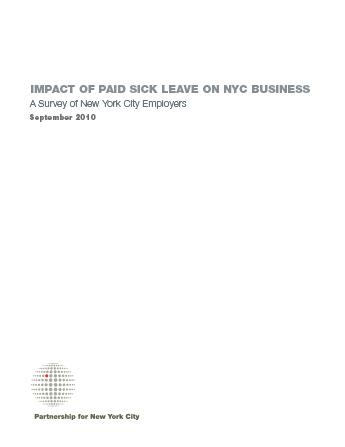Overview
The “swine flu” panic of 2009 sparked debate over how employment policies — specifically the failure of some employers to offer paid sick leave — might contribute to a public health crisis in New York City. In response, the Paid Sick Time Act, Intro 97 was introduced in the New York City Council on March 25, 2010. This bill would require that all New York City private and nonprofit employers provide paid sick leave that employees can use when they or a family member are ill.
Advocates contend that the cost to employers and consequent losses to the city economy arising from passage of the bill would be negligible. Reaction from employers, including many who currently offer paid sick leave, suggested that the hardships this bill would impose on employers were poorly understood.
The Partnership for New York City organized a survey that was open to all New York City employers and contracted with Ernst & Young LLP (EY) to analyze the results. This report summarizes the EY findings and draws some implications that are intended to provide constructive input to the City Council and other interested parties.
$789M
estimated increase in citywide private payroll costs if the Paid SIck Time Act is enacted.
$149M
of the incremental payroll cost of the bill would fall on small employers.
Report Highlights
Impact on Employers That Already Offer Paid Leave
Surprisingly, survey results show that 60% of the direct costs of the bill fall on those employers, large and small, that already offer paid leave to their employees.
Impact on Small Businesses
Employers that would have to provide paid leave benefits for the first time will experience the greatest hardship from the bill because they tend to be small employers, with relatively low wages and low margin businesses.
Key Takeaways
The results of the Partnership’s employer survey show that the direct and potential indirect costs of the Paid Sick Time Act are more significant than they at first seemed. Based on the findings in the survey and the EY analysis, the Partnership concludes that this is not the moment for New York City to proceed with a Paid Sick Leave mandate on private employers.
